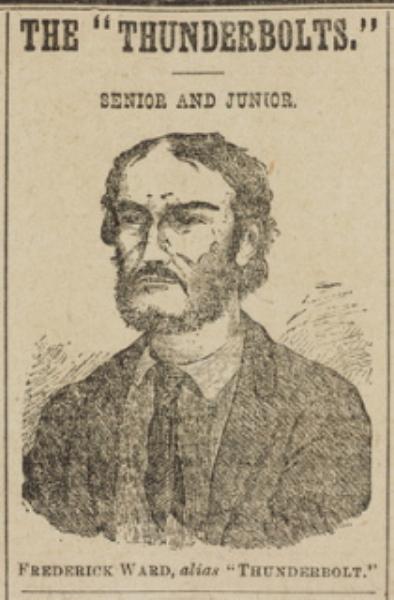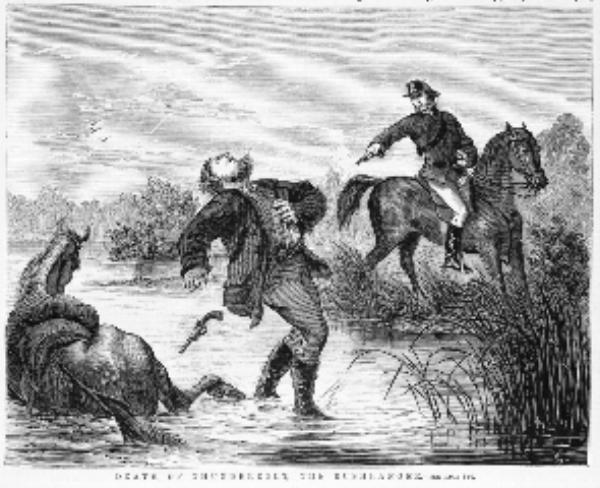STANTHORPE-BASED Robert Macmaurice has an eye for local history and research skills to match, and he has agreed to share the fruits of his labour with Southern Free Times readers with occasional contributions. This is his second piece, on bushranger Captain Thunderbolt who died in 1870. Thunderbolt was known to have performed a number of robberies around Warwick and the area now known as Stanthorpe also further south, before he was surprised and shot 25 May 1870 by Constable Alexander Walker near Uralla in New South Wales.
Captain Thunderbolt was the alias for Frederick Ward, who was born in Windsor, New South Wales, in 1835. He started his working life as a drover and horse breaker at Tocal Station on the Paterson River. It wasn’t long before his life of crime began and he was jailed in 1856 for stealing seventy-five horses – sentenced to ten years hard labour on Cockatoo Island, but given a conditional release in 1860.
Frederick Ward soon returned to a life of crime and was jailed again in 1861. He escaped in 1863 and from that time until his death he lived on the run and committed robberies, with the adopted name of Captain Thunderbolt. From 1865 onwards after a “shoot out” with police near Gunnedah he concentrated on robbing the mail coaches in the New England area. A number of Thunderbolt’s activities are identifiable with the Stanthorpe area, though he was more usually further south. These are some of the incidents that occurred around this area.
Wirth’s Circus German Musicians – During March 1868, a group of Wirth’s German musicians were robbed by Thunderbolt and a boy about twenty kilometres on the New South Wales side of Maryland Station. The four musicians were returning home after playing at the Tenterfield races. The two at first passed the musicians, but then wheeled around and presented a loaded revolver and called upon the musicians to dismount. Their pockets were rifled and 16 pounds taken. When the bandmaster complained that the money represented the takings of several days playing, Thunderbolt is said to have replied that ‘he didn’t care’. He further stated that ‘if it was his own brother he would take the money’. Thunderbolt then apparently took the names and addresses of the musicians and promised to return the money to them if he found better takings along the road.
Subsequent versions of this story have it that Thunderbolt asked the band to play The Blue Danube Waltz, along with a few other favourites of his. After some time of playing Thunderbolt is then said to have complimented the band and then given them their money back. This and other variations make it difficult to know what the truth is, but the first version above was reported within days of the robbery and is probably more reliable.
Mr Hart and his horse Minstrel – Mr Hart is described as the ration carrier from Maryland Station. He was robbed close to home in March 1868 also. Mr Hart had been to the Tenterfield races with his horse Minstrel and was carrying 105 pounds sterling, which was the proceeds from his gains at the races. Thunderbolt also decided to take Mr Hart’s horse and when he complained to Thunderbolt of being just a poor man who had come into a bit of luck at the races Thunderbolt gave him five pounds back.
Again there are variations in the telling of this incident in later reports. In one his name is reported as Pell and in another his name is Fell. Significantly, Thunderbolt is not recorded as returning the money to the musicians even though he had found his larger pickings.
Canning Downs Station Visitor – About March 1867 Thunderbolt is said to have visited Canning Downs presenting his card as a well-heeled squatter. He was received by Mr Wildash and put up for the night. Thunderbolt handed his horse, saddle and valise to his groom with instructions that they were to be ready at 8am to continue his journey to New England.
In the morning however Mr Wildash’s visitor was already travelling along with a number of thoroughbreds from Canning Downs Station. Mr Wildash, however did recover the horse that Thunderbolt had left in his apparent haste. This horse was mated with Pioneer (imp.) and the resulting filly was named, Kerosene.
Kerosene was purchased as a yearling, by Mr Harry Mitchell of Sandy Creek, Warwick, and raced once without distinction, on the 26 June 1867. Kerosene was later mated with Tamerlane and she produced a bay filly, which Mitchell named, Empress. Empress had a very impressive track record during the 1880’s and also went on to produce a line of successful gallopers. The Mitchell family are one of the most successful families on the Queensland turf. All the result of an unusual visitor!
Other sightings – There are other brief records of alleged sightings or meetings with Captain Thunderbolt. One Manager of a Bank, a Mr Stanley Spark claims that he was riding near Tenterfield with several thousand pounds in notes in his saddle bag. He was accosted by Thunderbolt, who did not rob him, but simply rode along with him to have a chat. On another occasion Thunderbolt held up a group of clergymen, but refrained from stealing from them, when he realised who they were. Others have reported being visited at their houses, or camps by Thunderbolt, and he simply sought their company and a meal.
One of these was Mrs Ellen Brosnan, who lived at Maryland. Another was Mr W. Urben at Acacia Creek near Killarney. On this latter occasion Thunderbolt asked Mr Urben what he would do if he ever met Thunderbolt. Mr Urben replied that he would get his shot gun off the wall and shoot the rotter! When Thunderbolt announced that he was in fact that man, Mr Urben got up and shook his hand. Having spent a most pleasant evening with him, he described Thunderbolt as one of the finest fellows he had ever met!
Even in the years following Thunderbolt’s death there continued to be reports about his latest robbery, or that he had been committed to trial. There certainly were other aspirants to Thunderbolt’s fame, but all appear to have had very short careers.








